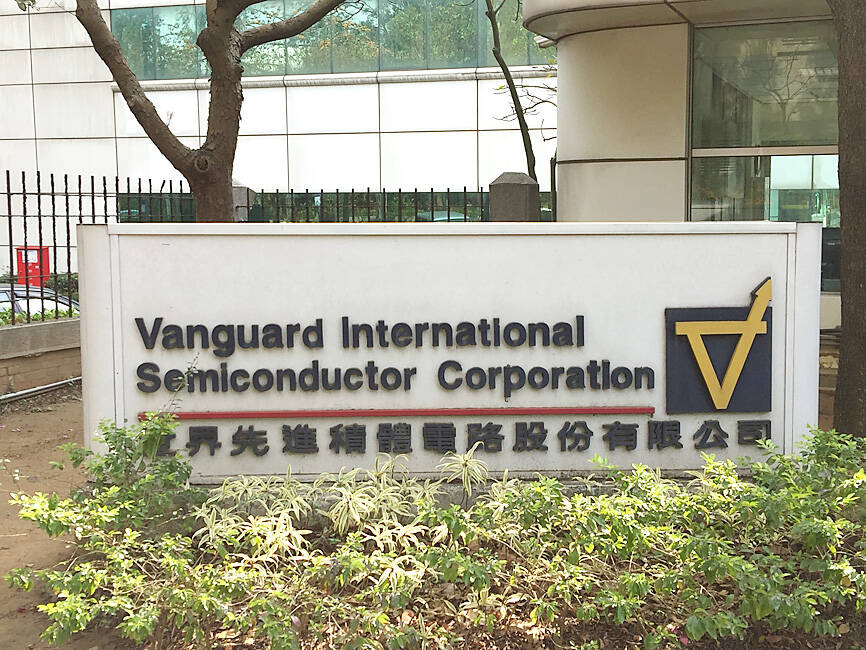Vanguard International Semiconductor Corp (世界先進), a contract chipmaker focused on making power management chips and drive ICs for displays, yesterday reaffirmed its view that revenue would return to growth this year, as negative impacts of high inflation, economic uncertainty, geopolitical frictions and a supply chain inventory glut lessen.
Last year, the chipmaker’s revenue plunged 26 percent year-on-year to NT$38.27 billion (US$1.2 billion), the lowest in four years, as demand faltered due to customers’ drastic inventory adjustments.
“Our company is expecting a mild recovery for the full year of 2024,” Vanguard chairman Fang Leuh (方略) told reporters at a media gathering in Taipei. “Consumer electronics are gradually returning to seasonal growth patterns this year following drastic inventory corrections starting from the second half of 2022.”

Photo: Grace Hung, Taipei Times
Customers from industrial and vehicle manufacturing segments are still striving to reduce excessive inventory, Fang said.
It might take one to two more quarters for them to reduce inventory to healthy levels, he said.
Vanguard has attracted more new customers intensifying their efforts to boost supply resilience amid geopolitical tensions, he said.
The chipmaker said it expects more orders next year and in 2026.
A majority of new orders are for power management chips used in consumer electronics, notebook computers and servers, it said.
Vanguard said based on the latest developments and customers’ inventory reduction progress, its first-quarter targets are achievable.
It expects wafer shipments this quarter to drop 6 percent to 8 percent sequentially due to seasonal weakness, the chipmaker said, adding that the average selling price would be flat.
This year, revenue might expand a high-single-digit percentage or a low-double-digit percentage, the Hsinchu-based chipmaker projected last month.
It is diligently looking at potential investment in a new 12-inch fab as it expects capacity scarcity in the long term, Vanguard said.
The company is operating five 8-inch fabs, including one located in Singapore.
As there is a slim chance of Vanguard investing in the US and Europe due to expensive manufacturing costs and work culture differences, Singapore has been singled out by analysts as an optimal location because of its readiness to embrace more foundry fabs.
However, Vanguard did not give further details about its 12-inch fab investment.
Operational costs of a 12-inch fab in Singapore are estimated to be 20 percent to 30 percent higher than in Taiwan, an industry source said.
The US is the most expensive destination with costs two to three times higher than Taiwan, the source said.
Europe and Japan came next with about 50 percent higher costs than Taiwan, they said.
Following the latest electricity rate hikes in Taiwan, Vanguard said that its utility costs would increase 10 to 12 percent this year as the company consumes electricity heavily and is to pay 15 percent higher electricity rates from next month.
That might lead to an increase in its electricity bill this year ranging from NT$200 million to NT$300 million, it said.
The increase would erode gross margin by 0.5 percent to 1 percent this year, it said.
It would discuss with customers whether to reflect the increases in utility costs in its prices, the chipmaker added.

BUSINESS UPDATE: The iPhone assembler said operations outlook is expected to show quarter-on-quarter and year-on-year growth for the second quarter Hon Hai Precision Industry Co (鴻海精密) yesterday reported strong growth in sales last month, potentially raising expectations for iPhone sales while artificial intelligence (AI)-related business booms. The company, which assembles the majority of Apple Inc’s smartphones, reported a 19.03 percent rise in monthly sales to NT$510.9 billion (US$15.78 billion), from NT$429.22 billion in the same period last year. On a monthly basis, sales rose 14.16 percent, it said. The company in a statement said that last month’s revenue was a record-breaking April performance. Hon Hai, known also as Foxconn Technology Group (富士康科技集團), assembles most iPhones, but the company is diversifying its business to

Apple Inc has been developing a homegrown chip to run artificial intelligence (AI) tools in data centers, although it is unclear if the semiconductor would ever be deployed, the Wall Street Journal reported on Monday. The effort would build on Apple’s previous efforts to make in-house chips, which run in its iPhones, Macs and other devices, according to the Journal, which cited unidentified people familiar with the matter. The server project is code-named ACDC (Apple Chips in Data Center) within the company, aiming to utilize Apple’s expertise in chip design for the company’s server infrastructure, the newspaper said. While this initiative has been

Clambering hand-over-hand, sweat dripping into his eyes, a durian laborer expertly slices a cumbersome fruit from a tree before tossing it down to land with a soft thump in his colleague’s waiting arms about 15m below. Among Thailand’s most famous and lucrative exports, the pungent “king of fruits” is as distinctive in its smell as its spiky green-brown carapace, and has been farmed in the kingdom for hundreds of years. However, a vicious heat wave engulfing Southeast Asia has resulted in smaller yields and spiraling costs, with growers and sellers increasingly panicked as global warming damages the industry. “This year is a crisis,”

HIGH-TECH: As leading-edge process technologies become more complicated, only a handful of players are able to provide design services, the company’s CEO said Artificial intelligence (AI) chip designer Alchip Technologies Ltd (世芯) yesterday said that revenue would grow significantly again in 2026 after adding a major AI chip customer, reversing moderation amid a product transition next year. The Taipei-based application-specific IC (ASIC) designer reiterated its strong revenue growth forecast for this year and 2026 after its stock plummeted about 23 percent to NT$3,145 from a peak of NT$4,085 on March 6 amid growing competition. Alchip said it has built strong partnerships with cloud service providers (CSP), denying that it had lost orders to smaller competitors such as Faraday Technology Corp (智原). Faraday said it has secured